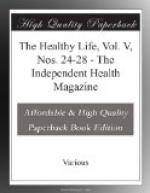S. GERTRUDE FORD.
THE PLAY SPIRIT.
We all long for reality. Most of the amusements in the world are imitations of the reality for which we long. They promise a satisfaction they are unable to give. Drink, mechanical love-making, all snatched gratification of the senses, religious excitement, revivalist meetings, and so forth, most theatre-going and sports, all simulate the real glory of life. They bring an illusion of well-being. They produce a glow in the nervous system. They cause the outlines of everyday life as we know it to grow suffused. They give us a momentary sense of heightened power and freedom. We float easily in a happy world. A sort of relaxation has been achieved. The less common forms of amusement bring us nearer to the gateway of reality. For some, they have been the rivers leading to the ocean of truth itself.
Art, for instance, the interpretation of life in terms of beauty; the “artist,” the man in whom sensuous perception is supreme, offers us a sublime aspect of reality. He dwells in the universe constructed for him by his senses and tells us of its glories. He achieves “freedom.” The veil covering reality is woven for him far thinner than for common men. He sees life moving eternally behind the forms he separates and “creates.” And to those of us who are akin to him, who are temperamentally artistic, he offers freedom of a kind. The contemplation of a work of art releases the tension of the nerves. To use the language of psychology it “arrests” us, suspends the functions of our everyday surface personality, abolishes for a moment time and space, allows the “free,” generally suppressed subconscious self to come up and flood the surface intelligence, allows us for a moment to be ourselves. But, still, this momentary relaxation, this momentary “play,” this holiday from the surface “I,” remains an affair dependent upon suggestive symbols coming from “without.” The supreme artist achieves freedom. We, who in matters of art are the imitative mass, can only have “change,” a new heaven and earth, a fresh “culture.”
Then there is love. That promises, at the outset, complete escape into freedom and reality. And supreme lovers, both of individuals and of “Humanity,” have indeed found freedom and the pathway to reality in love. But ordinary everyday people rushing idolatrously out to find themselves in others find in the end only another I. The religions perhaps work best and longest. But even here average humanity, where the mystical sense is feeble, are thrown back in the end upon ethics—and go somewhat grimly through life doing their duty, living upon the husks of doctrine, the notions and reports of other men.
If the play spirit within us, that longing for the real joy of life, for real relaxation and re-creation, fares so poorly for most of us in the amusements large and small that life offers to our




